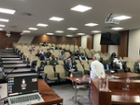This research project examines how could a Multilateral Investment Court be made beneficial for the states of Sub-Saharan Africa.
The Multilateral Investment Court (‘MIC’) is a newly proposed international court for resolving investor-State disputes. Currently such disputes are settled by arbitration. Some States have advocated for reforms to this system for various reasons, including (i) lack of consistency of jurisprudence and predictability of outcomes, (ii) lack of transparency of arbitral proceedings, (iii) perception of bias among arbitrators, (iv) frivolous claims, and (v) the high costs of ISDS proceedings. A reform process is now underway, and it is expected to conclude in 2025. Over 100 States are locked in negotiations, including 15 from Sub-Saharan Africa. The most prominent reform proposal put forward is the MIC, which is the brainchild of the European Union.
Some States have already indicated their intention to sign up to the MIC. Sub-Saharan African states have not committed and are discussing whether and under what conditions the MIC could be beneficial for them. The Institute organized a seminar in November 2022 at the Mandela Institute, University of the Witwatersrand to discuss this question. The panelists were African junior scholars, while the other participants were senior scholars and government officials. With this format, African junior scholars could present their ideas on making the MIC beneficial for Sub-Saharan Africa directly to the decision-makers. Proposals included (i) giving a right to local (African) communities to sue foreign investors in the MIC, (ii) using the MIC as part of the toolkit that could be used to fight endemic corruption in Sub-Saharan Africa, and (iii) better facilitating the possibility for African investors to bring claims against States for the mistreatment of their investments.
The workshop papers are now published as blog posts on Afronomicslaw Blog. Additionally, the preparation for an anthology containing these papers is now underway.
- Prof. Jonathan Klaaren, Wits School of Law, University of the Witwatersrand
- Asso. Prof. Emmanuel Laryea, Monash Law School, Monash University

